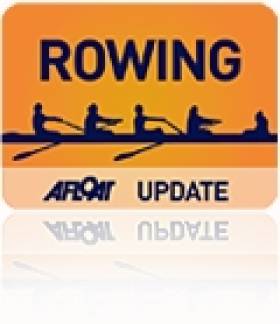Displaying items by tag: Hennessy
Fine Finish Sees Ireland Into Second World Rowing A Final
#Rowing: Ireland’s under-23 lightweight quadruple joined the under-23 lightweight pair at the A Final stage of the Under-23 World Championships in Rotterdam. The crew of Fintan McCarthy, Shane O’Connell, Stephen O’Connor and stroke Colm Hennessy finished second to Britain in a fine semi-final. Ireland and Sweden held the qualifying places behind Britain for a good part of the course, but New Zealand mounted an attack in the final third. Ireland upped their rate and held out for second, with Sweden also moving into the A Final.
The under-23 heavyweight quadruple finished fifth in their semi-final. The race was won by Australia, with New Zealand and Britain booking their A Final places by taking second and third. Ireland fought with Ukraine to avoid last and held out at the end to win this battle.
World Rowing Championships, Rotterdam (Irish interest; selected results)
Men
Under-23 Lightweight Pair - Semi-Finals (First Three to A Final; rest to B Final) - Semi-Final One: 1 Greece 6:39.18, 2 Switzerland 6:40.01, 3 China 6:44.52. Semi-Final Two: 1 Ireland (S Mulvaney, D O’Malley) 6:46.20, 2 Turkey 6:49.11, 3 United States 6:50.75.
Under-23 Quadruple - Semi-Finals (First Three to A Final; rest to B Final) - Semi-Final One: 1 Poland 5:51.05, 2 Italy 5:52.38, 3 Germany 5:52.53. Semi-Final Two: 1 Australia 5:54.34, 2 New Zealand 5:56.53, 3 Britain 5:56.93; 5 Ireland (D Buckley, J Casey, P Boomer, S McKeown) 6:12.94.
Under-23 Lightweight Quadruple - Semi-Finals (First Three to A Final; rest to B Final) - Semi-Final One: 1 Italy 6:07.44, 2 Canada 6:09.42, 3 Germany 6:10.05. Semi-Final Two: 1 Britain 6:06.01, 2 Ireland (F McCarthy, S O'Connell, S O'Connor, C Hennessy) 6:07.18, 3 Sweden 6:07.28.
Ireland Junior Quadruple Are Afloat Rowers of the Month For August
#Rowers of the Month: The Afloat Rowers of the Month for August are the Ireland junior quadruple scull which won two gold medals at the Coupe de la Jeunesse in Szeged in Hungary. In early September, the senior team would make their mark at the World Championships, but in August it was the juniors which came away with a five-medal haul. The junior women’s double of Aoife Casey and Emily Hegarty took silver on Saturday and Sunday and single sculler Dervla Forde took bronze on the Sunday. But the most successful crew was the junior men’s quadruple of Colm Hennessy, Eoghan Whittle, Patrick Munnelly and Andrew Goff. They had also taken gold at the 2014 Coupe.
Rower of the Month awards: The judging panel is made up of Liam Gorman, rowing correspondent of The Irish Times and David O'Brien, Editor of Afloat magazine. Monthly awards for achievements during the year will appear on afloat.ie and the overall national award will be presented to the person or crew who, in the judges' opinion, achieved the most notable results in, or made the most significant contribution to rowing during 2015. Keep a monthly eye on progress and watch our 2015 champions list grow.
Cork Sculling Ladder Presentation
The 2013-2014 Cork Sculling Ladder presentation (sponsored by Hanley Calibration Ltd) took place at Cork Constitution Football Club, Temple Hill, on Tuesday evening. Judge Donagh McDonagh, presented the trophies to the overall winner, Colm Hennessy (Shandon Boat Club) and the women’s overall winner, Marie O’Neill (Cork Boat Club). The 42nd Cork Sculling Ladder began on Sunday, October 6th, 2013 with the time trials at the Marina course, Cork and finished in mid April, 2014. John Mitchell (Lee Rowing Club) won the time trial and Marie O’Neill retained the overall women’s. Over 150 scullers participated in this year’s sculling ladder.
Judge McDonagh, who also presented the tankards to the section winners, is a former oarsman himself. He was part of the crew which won a maiden eight (now novice eight) championship of Ireland in 1973 with Dublin University Boat Club (Trinity). He was captain of Trinity in 1975 and is now club captain of Lady Elizabeth Boat Club.
Colm Hennessy had an excellent sculling ladder, winning the men’s open, intermediate, Junior 18 and Junior 16 sections. Marie O’Neill won the women’s open and Masters A sections.
The 43rd Cork Sculling Ladder time trial takes place at the Marina course, Cork on Sunday, October 5th, 2014.






























































